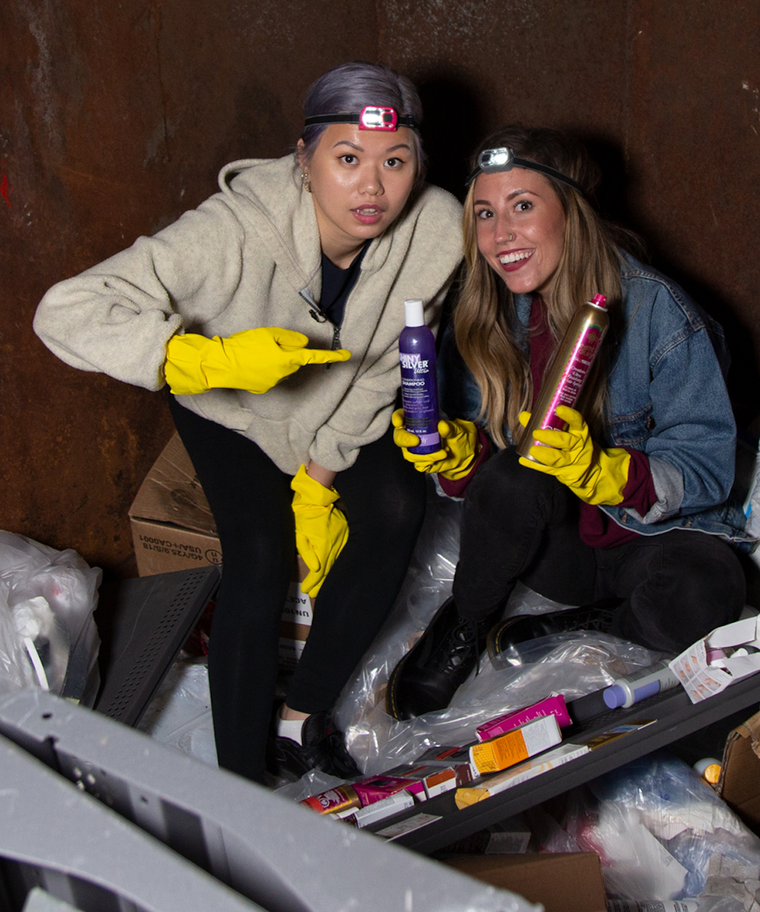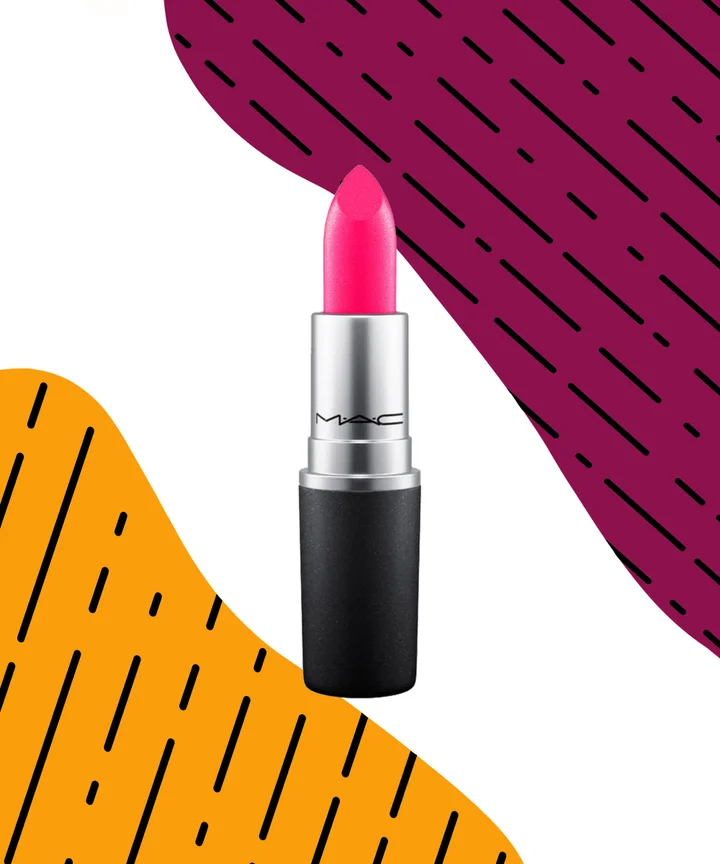YouTubers are digging through the trash for free beauty products — but why are they there in the first place?

Beauty with Mi, hosted by Refinery29's beauty writer Mi-Anne Chan, explores the coolest new trends, treatments, products, and subcultures in the beauty world. Never miss an episode by subscribing here.
Jessica Casler's one-bedroom apartment is packed to the brim with things she's found on the curb or at
the bottom of trash cans. Glittery palettes, scented lotions, expensive hair tools, and fluffy makeup brushes are scattered across a table in her kitchen — the collective bounty of seven years of
dumpster diving.
I spot some familiar brands: Clinique, Sexy Hair, It Cosmetics, Anastasia Beverly Hills. Some of them have clearly been used, while others appear to be completely untouched. And she found
all of it in the dumpsters behind the beauty store near her home in New Jersey.
Casler is part of a community of dumpster divers who share their finds on
YouTube. In a world where
hauls documenting new product purchases have become commonplace, dumpster diving videos serve as a type of "anti-haul," shedding light on cosmetic waste and breathing new life into products typically destined for landfills.
Over the years, Casler has discovered thousands of dollars worth of products in the dumpsters behind stores like Ulta Beauty and Sally Beauty. A large number of these products are returns or testers, while others are leftovers from final sales. "The first time I went diving, I found a box that said 'returns or damaged,'" Casler says. "I pulled it out and inside was a bunch of nice product. I put it in my car and went home. Not every dive goes like that, but the first time was very successful."

So, what happens with all the recovered products these divers bring home? Many people use the items themselves, but a growing number have taken to reselling them online in what's become a booming black market. Texas-based dumpster diver, Matt Malone, told
Wired he could make upwards of $250,000 a year if he dedicated himself to dumpster diving full time. But he primarily sells electronic waste — and beauty products pose a much greater hazard.
Because they're swiped directly onto skin, lips, and eyes, beauty products from the trash can put consumers at risk of contracting infectious diseases like staph, herpes, and E. coli, says
Joshua Zeichner, MD, director of Cosmetic & Clinical Research in Dermatology at Mount Sinai Hospital. Yes, even if you dip them in alcohol. "When I hear about sanitizing the applicator of a liquid lipstick, you're not sanitizing the liquid itself," he says. "Products that are liquid or in a moist environment creates an environment that allows for bacteria, viruses, and other microorganisms like fungi to grow."
And even if the products still have their protective seal, there's an issue of efficacy. Some ingredients, such as retinol, are less effective if exposed to sunlight or high temperatures (like, say, a dumpster on a hot summer day). Others might be expired. "If you're looking at something like sunscreen and you're using it past its expiration date, that sunscreen filter isn't doing the job it should be doing. You're putting yourself at risk," Dr. Zeichner adds
Legally speaking, dumpster diving occupies a gray area. Thanks to the 1988 Supreme Court case
California v. Greenwood, the warrantless search and seizure of garbage left for collection outside of private property isn't prohibited by the Fourth Amendment. In short, individuals or businesses have no reasonable expectation of privacy for items that were discarded, which means dumpster diving, as long as it occurs on public property, is legal. Certain local ordinances, however, can prohibit the practice in some places.
Many divers feel the benefits of dumpster diving outweigh the risks, especially if it means pointing a finger at America's waste problem. "The first time I went dumpster diving, it was so eye opening," says Casler. "When people hear that I dumpster dive, they always wonder why. But there's so much more than that. I hate thinking that all that stuff is going to be unused and go to a landfill when it doesn't need to be."
If you search
"beauty product dumpster diving" on YouTube, the videos with the highest views (some in the millions) are all from dives behind Ulta Beauty stores. When asked why the retailer instructs employees to throw products away, and their stance on dumpster diving in general, Ulta Beauty provided this statement:
"Health and safety is a top priority for Ulta Beauty and we strongly discourage the unsafe, and sometimes illegal practice of “dumpster diving.” We are aware that individuals sometimes assume the risks associated with this practice and retrieve discarded products. Ulta Beauty, like other retailers, disposes of products for a reason. Products that are damaged, used, expired or otherwise unsaleable or unsuitable for donation are disposed of in accordance with applicable laws, rules and regulations. These products should never be retrieved or used."
It's understandable that stores need to dispose of their unsalable product, especially if it poses a potential health concern. That's why some retailers have asked their employees to destroy makeup to keep it out of the hands of divers, including taking a knife to powders, cutting up lipsticks, or tossing foundation over makeup. This practice has become known in the dumpster diving community as "souping."

But while souping might deter dumpster divers, it doesn't solve the greater issue of waste — and that's a conversation that starts at the top. Beyond brands making efforts to create
refillable makeup,
eco-friendly packaging, and practice
low-impact production, retailers and brands need to take better steps to recycle unused products. But because a large majority of beauty product packaging can't be processed in municipal recycling centers (pumps, pipettes, and some tubes don't qualify, for example), that often means bringing in third-party recycling organizations.
TerraCycle, which specializes in hard-to-recycle materials, is one such organization that works with major beauty brands like Garnier, Burt's Bees, and Tom's of Maine. The Garnier program, which is TerraCycle's longest standing beauty partnership, has diverted over 11.3 million pieces of waste from landfills. Says Gina Herrera, the US brand partnerships director at TerraCycle, it's high time for retailers to start thinking about the end of life of their products — and it's something consumers want, too; more than
66% of global consumers report they would pay more for a sustainable product.
Despite the obvious wasted product, many stores
have made steps toward a more sustainable future.
Ulta Beauty, for example, has created a Corporate Energy Team which reduced the store's electric consumption by over 3,000 metric tons of greenhouse gas emissions in 2017. The store also makes an effort to recycle cardboard and plastic shrink wrap. But there's a long way to go across the industry.
At the consumer level, there's a responsibility to make smarter purchasing decisions, too. Beyond choosing to support sustainable brands, it's also important to consider returns. While it's great that stores allow customers to return used makeup, this means that they're also required to throw that product away for obvious health and hygiene reasons. This contributes exorbitantly to the waste created by retailers, as consumers lean more heavily on generous policies — especially with the rise of e-commerce which doesn't always allow for testing.

In an attempt to really wrap my mind around the sheer amount of waste the beauty industry produces, I accompanied Casler on a midnight dive. As Casler and I sifted through a dumpster behind a strip mall near her home, we found two boxes full of products. Next to a bag of what smelled like the store's food waste, we spotted dozens of discounted hairsprays, hair gels, and dye. In a box a few inches away, we found a complete set of powder acrylic polish, body lotion, and shampoo. "Oh, this is that good shampoo for blondes," Casler said as she sifted through the bottles. While there was definitely a thrill in discovering products, it was coupled with dread over witnessing the sheer amount of waste from a single day.
While dumpster diving might look like a niche pastime, the community of divers are actually bringing up a much larger conversation about ethical consumption and corporate responsibility. And if the
climate reports have shown us anything, it's that companies and consumers need to take responsibility for the impact they've having on the world — and soon.
When asked what she'd like to see from the dumpster diving community in the future, Casler looked me dead in the eye and told me she hopes it doesn't even exist. "You wouldn't even want to dumpster dive, because everything would have a home."















 So, what happens with all the recovered products these divers bring home? Many people use the items themselves, but a growing number have taken to reselling them online in what's become a booming black market. Texas-based dumpster diver, Matt Malone, told
So, what happens with all the recovered products these divers bring home? Many people use the items themselves, but a growing number have taken to reselling them online in what's become a booming black market. Texas-based dumpster diver, Matt Malone, told  But while souping might deter dumpster divers, it doesn't solve the greater issue of waste — and that's a conversation that starts at the top. Beyond brands making efforts to create
But while souping might deter dumpster divers, it doesn't solve the greater issue of waste — and that's a conversation that starts at the top. Beyond brands making efforts to create  In an attempt to really wrap my mind around the sheer amount of waste the beauty industry produces, I accompanied Casler on a midnight dive. As Casler and I sifted through a dumpster behind a strip mall near her home, we found two boxes full of products. Next to a bag of what smelled like the store's food waste, we spotted dozens of discounted hairsprays, hair gels, and dye. In a box a few inches away, we found a complete set of powder acrylic polish, body lotion, and shampoo. "Oh, this is that good shampoo for blondes," Casler said as she sifted through the bottles. While there was definitely a thrill in discovering products, it was coupled with dread over witnessing the sheer amount of waste from a single day.
While dumpster diving might look like a niche pastime, the community of divers are actually bringing up a much larger conversation about ethical consumption and corporate responsibility. And if the
In an attempt to really wrap my mind around the sheer amount of waste the beauty industry produces, I accompanied Casler on a midnight dive. As Casler and I sifted through a dumpster behind a strip mall near her home, we found two boxes full of products. Next to a bag of what smelled like the store's food waste, we spotted dozens of discounted hairsprays, hair gels, and dye. In a box a few inches away, we found a complete set of powder acrylic polish, body lotion, and shampoo. "Oh, this is that good shampoo for blondes," Casler said as she sifted through the bottles. While there was definitely a thrill in discovering products, it was coupled with dread over witnessing the sheer amount of waste from a single day.
While dumpster diving might look like a niche pastime, the community of divers are actually bringing up a much larger conversation about ethical consumption and corporate responsibility. And if the